Percona XtraDB Cluster in Kubernetes
EnterpriseBacula Enterprise Only
This solution is only available for Bacula Enterprise. For subscription inquiries, please reach out to sales@baculasystems.com.
This document outlines the procedure for utilizing the Bacula MySQL Plugin running in a container to perform backups of the Percona XtraDB Cluster.
For additional details regarding Percona XtraDB Cluster, visit: https://www.percona.com
The software versions used in this use case:
Percona XtraDB Cluster: Server version: 8.0.36-28.1 Percona XtraDB Cluster (GPL), Release rel28, Revision bfb687f, WSREP version 26.1.4.3
MySQL Client: mysql Ver 8.0.37 for Linux on x86_64 (MySQL Community Server - GPL)
Percona XtraBackup: xtrabackup version 8.0.35-31 based on MySQL server 8.0.35 Linux (x86_64) (revision id: 55ec21d7)
Bacula File Daemon and MySQL Plugin Kubernetes Deployment
Dockerfile
Use the following Dockerfile to build a Bacula File Daemon with the MySQL Plugin installed image.
# cat Dockerfile
FROM debian:bullseye
LABEL maintainer="Bacula Systems SA"
LABEL version="18.0.5"
LABEL name="Bacula Enterprise Edition Client"
LABEL vendor="BACULA SYSTEMS SA"
LABEL summary="This is a Bacula File Daemon with the MySQL plugin"
LABEL description="This image contains a Bacula File Daemon which allows connection between this pod resources and the Bacula Director."
# Update image
RUN apt update
# install required dependencies for the mysql client and Percona XtraBackup
RUN apt install lz4 ca-certificates curl gnupg lsb-release wget -y
# install the Bacula File Daemon and the MySQL Plugin
RUN mkdir -p /etc/apt/keyrings
RUN curl -fsSL https://qa.baculasystems.com/dl/QA_SL_2-adsfJLU783jklAKjd667aJKNyX/BaculaSystems-Public-Signature-08-2017.asc -o /etc/apt/keyrings/bacula.asc
RUN chmod a+r /etc/apt/keyrings/bacula.asc
RUN echo "deb [arch=$(dpkg --print-architecture) signed-by=/etc/apt/keyrings/bacula.asc] https://qa.baculasystems.com/dl/QA_SL_2-adsfJLU783jklAKjd667aJKNyX/debs/bin/18.0.5/bullseye-64/ bullseye main" > /etc/apt/sources.list.d/Bacula-Enterprise-Edition.list
RUN echo "deb [arch=$(dpkg --print-architecture) signed-by=/etc/apt/keyrings/bacula.asc] https://qa.baculasystems.com/dl/QA_SL_2-adsfJLU783jklAKjd667aJKNyX/debs/mysql/18.0.5/bullseye-64/ bullseye mysql" > /etc/apt/sources.list.d/Bacula-Enterprise-Edition-mysql-plugin.list
RUN apt-get update
RUN apt-get install -y bacula-enterprise-client bacula-enterprise-mysql-plugin
# download and install the mysql client for Percona/MySQL 8.0
RUN wget https://repo.mysql.com/mysql-apt-config_0.8.29-1_all.deb
RUN DEBIAN_FRONTEND=noninteractive dpkg -i mysql-apt-config_0.8.29-1_all.deb
RUN apt-get update
RUN apt -y install mysql-client
RUN apt list --installed | grep mysql > /tmp/apt_mysql.txt
# download and install Percona XtraBackup 8.0
RUN wget https://repo.percona.com/apt/percona-release_latest.$(lsb_release -sc)_all.deb
RUN DEBIAN_FRONTEND=noninteractive dpkg -i percona-release_latest.$(lsb_release -sc)_all.deb
RUN percona-release enable pxb-80 release
RUN apt -y install percona-xtrabackup-80
RUN apt autoremove
# use the bacula-fd.conf file previously configured for a specific Bacula Director / configuration
RUN rm /opt/bacula/etc/bacula-fd.conf
COPY bacula-fd.conf /opt/bacula/etc/bacula-fd.conf
# copy required my.cnf and .my.cnf files to the bacula-fd with the specific MySQL configuration needed to access the Percona cluster
COPY my.cnf /opt/bacula/etc
COPY .my.cnf /opt/bacula/etc
# expose bacula-fd port
EXPOSE 9102
USER root
# Start the Bacula File Daemon service
CMD ["/opt/bacula/bin/bacula-fd", "-f"]
The .my.cnf file used in this use case:
~/bacula-fd-mysql# cat .my.cnf [client] host=10.43.198.239 <--- The ClusterIP address of the pxc-db-haproxy user=root password=2R7D9D.6V1I+5Z,F$ <--- root password get from the `pxc-db-secrets`# kubectl get service -n pxc NAME TYPE CLUSTER-IP EXTERNAL-IP PORT(S) AGE bacula-fd ClusterIP 10.43.80.87 10.0.97.201 9102/TCP 5d22h my-db-pxc-db-haproxy ClusterIP 10.43.4.195 <none> 3306/TCP,3309/TCP,33062/TCP,33060/TCP 12d my-db-pxc-db-haproxy-replicas ClusterIP 10.43.54.231 <none> 3306/TCP 12d my-db-pxc-db-pxc ClusterIP None <none> 3306/TCP,33062/TCP,33060/TCP 12d my-db-pxc-db-pxc-unready ClusterIP None <none> 3306/TCP,33062/TCP,33060/TCP 12d percona-xtradb-cluster-operator ClusterIP 10.43.248.174 <none> 443/TCP 12d pxc-db-haproxy ClusterIP 10.43.198.239 <none> 3306/TCP,3309/TCP,33062/TCP,33060/TCP 12d# kubectl -n pxc get secrets pxc-db-secrets -o jsonpath="{.data.root}" | base64 --decode
Build an image using the Dockerfile, and tag/push it to a local registry in the Kubernetes Cluster.
Important Notes
The mysql-client and the Percona XtraBackup for MySQL versions installed must be compatible with the Percona XtraDB Cluster MySQL version.
Have a
.my.cnffile with user-specific options to allow the connection from the MySQL Plugin to the Percona XtraDB Cluster.Have the
my.cnffile used by the Percona XtraDB Cluster, or use a Kubernetes configmap.Have the
bacula-fd.conffile previously configured (the Director the File Daemon will use, for example), or use a Kubernetes configmap for a validbacula-fd.conffile.It is possible to use any base image - Debian Bullseye is used in this use case - but dependencies and external programs versions could change.
Create bacula-fd Deployment in Kubernetes Cluster
After creating the bacula-fd deployment in the Kubernetes Cluster, attach one of the datadir persistent volumes, used by the Percona Cluster, to the bacula-fd pod, and mount the volumes in the bacula-fd container.
It is important to provide an external access for the communication between the Bacula File Daemon in the Kubernetes Cluster and both the Director and the Storage Daemon, when the services run outside the Kubernetes Cluster.
In this use case, the EXTERNAL-IP configured to the bacula-fd service is the ip address of one of the Kubernetes Master nodes:
# kubectl get service -n pxc NAME TYPE CLUSTER-IP EXTERNAL-IP PORT(S) AGE bacula-fd ClusterIP 10.43.80.87 10.0.97.201 9102/TCP 5d22h
An External Load Balancer or Ingress can be used as well.
Backup and Restore using bacula-fd Service in Kubernetes Cluster
Using the MySQL Plugin, both DUMP and Binary modes can be used to backup the Percona XtraDB Cluster.
For details about the MySQL Plugin backup configuration, refer to the main MySQL Plugin page.
Fileset Configuration
The Fileset configuration used in this use case for DUMP and Binary mode backups:
Fileset { Name = "percona-dump-fileset" Include { Options { IgnoreCase = yes OneFs = no Signature = Md5 } Plugin = "mysql: debug verbose abort_on_error mycnf_dir=\"/opt/bacula/etc/\" config_file=\"/opt/bacula/etc/my.cnf\"" } Exclude { } }Fileset { Name = "percona-binary-fileset" Include { Options { IgnoreCase = yes OneFs = no Signature = Md5 } Plugin = "mysql: debug abort_on_error mode=\"binary\" mycnf_dir=\"/opt/bacula/etc\" config_file=\"/opt/bacula/etc/my.cnf\" backup_software=\"xtrabackup\"" } Exclude { } }
Restore - BINARY mode - Complete Server - without preparation
To allow a restore of the data in the datadir Percona Cluster persistent volumes, one of the datadir persistent volumes must be mounted to the bacula-fd container as ReadWrite Access Mode.
It is recommended to stop the Percona XtraDB Cluster to perform the complete server restore:
# kubectl -n pxc patch --type=merge --patch='{ "spec": { "pause": true } }' pxc pxc-db perconaxtradbcluster.pxc.percona.com/pxc-db patched
And remove all, if any, existent files from the current /var/lib/mysql directory in the datadir persistent volume. This operation can be done from the bacula-fd container.
Restore Files into Local Directory
Run a restore by selecting either Full or Incremental job corresponding to the specific point in time when the MySQL server should be restored. The files will be restored in a local directory of the bacula-fd container:
root@bacula-fd-86bfd77786-98qxm:/opt/bacula/archive/bacula-restores# ls -lR .: total 8 drwxrwsr-x 3 root 1001 4096 Nov 20 14:43 @MYSQL drwxr-xr-x 3 root root 4096 Nov 21 09:05 opt ./@MYSQL: total 4 drwxrwsr-x 2 root 1001 4096 Nov 20 14:43 main ./@MYSQL/main: total 82764 -rw-r----- 1 root 1001 2020282 Nov 20 14:41 all-databases.34206973.xbstream -rw-r----- 1 root 1001 1954746 Nov 20 14:42 all-databases.34208728.xbstream -rw-r----- 1 root 1001 80760446 Nov 20 14:40 all-databases.xbstream -rw-r--r-- 1 root root 9 Nov 15 14:13 my.cnf -rw-r--r-- 1 root root 536 Nov 20 14:43 mysql.dat
This is an example to restore one Full and two Incremental jobs using BWeb:
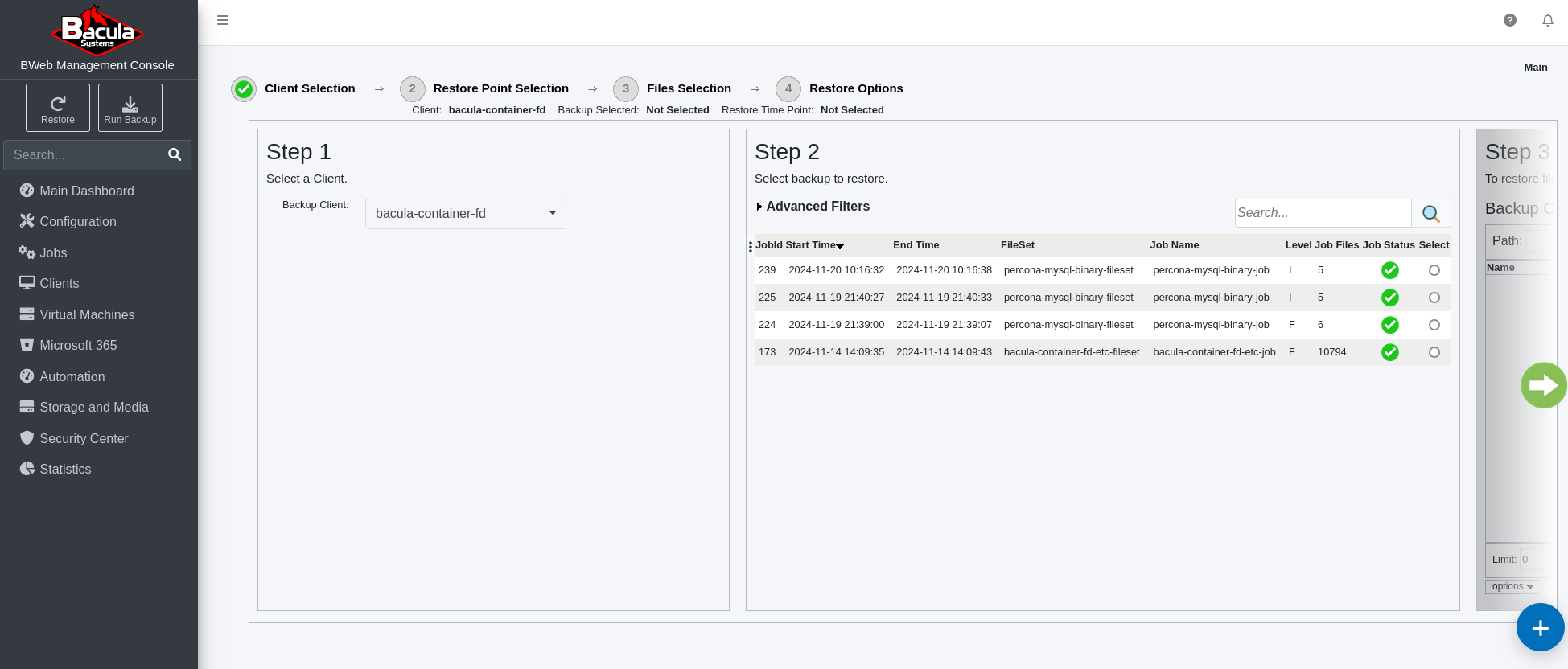
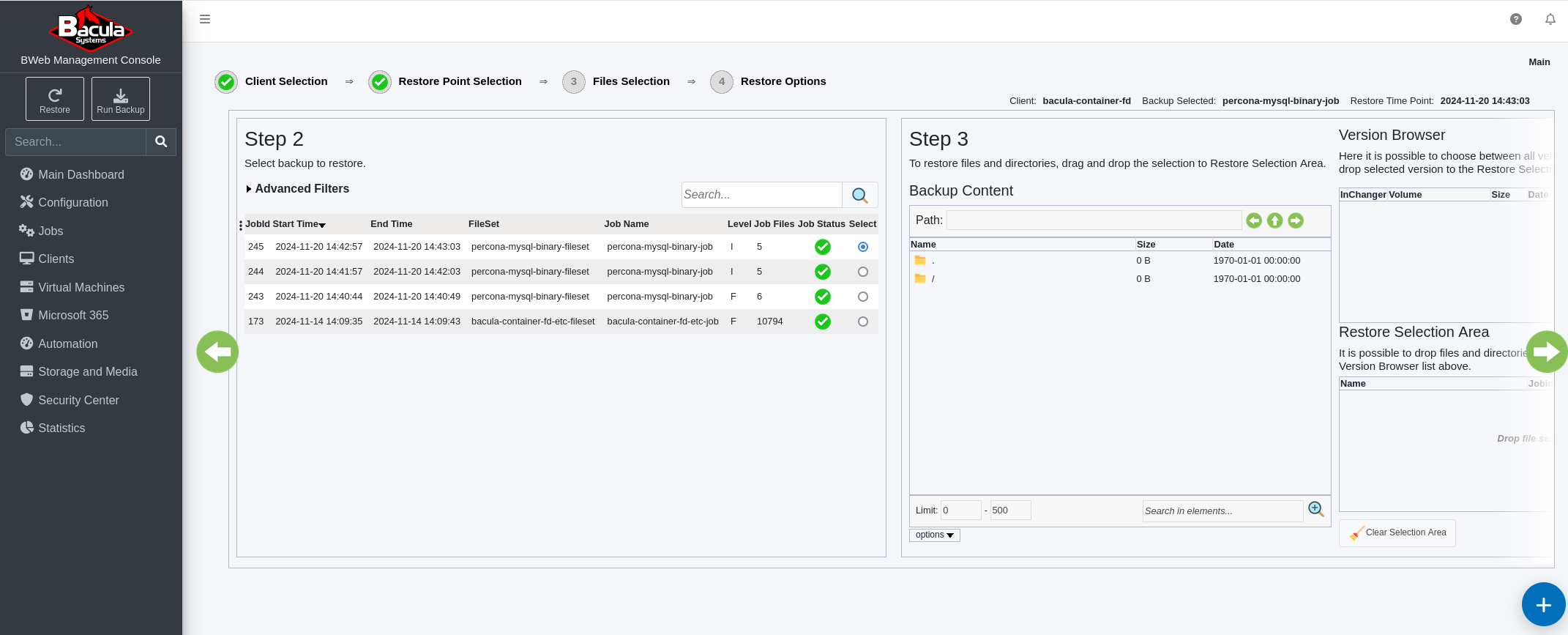
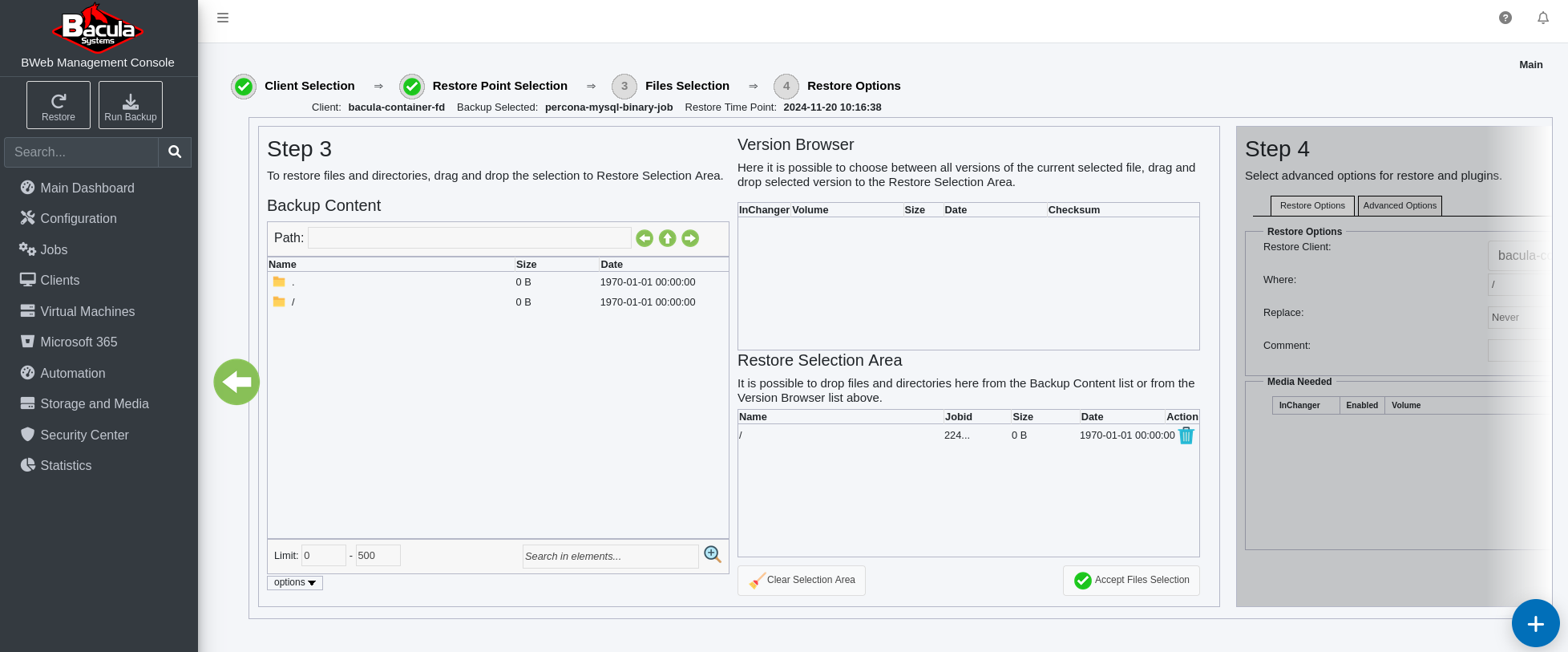
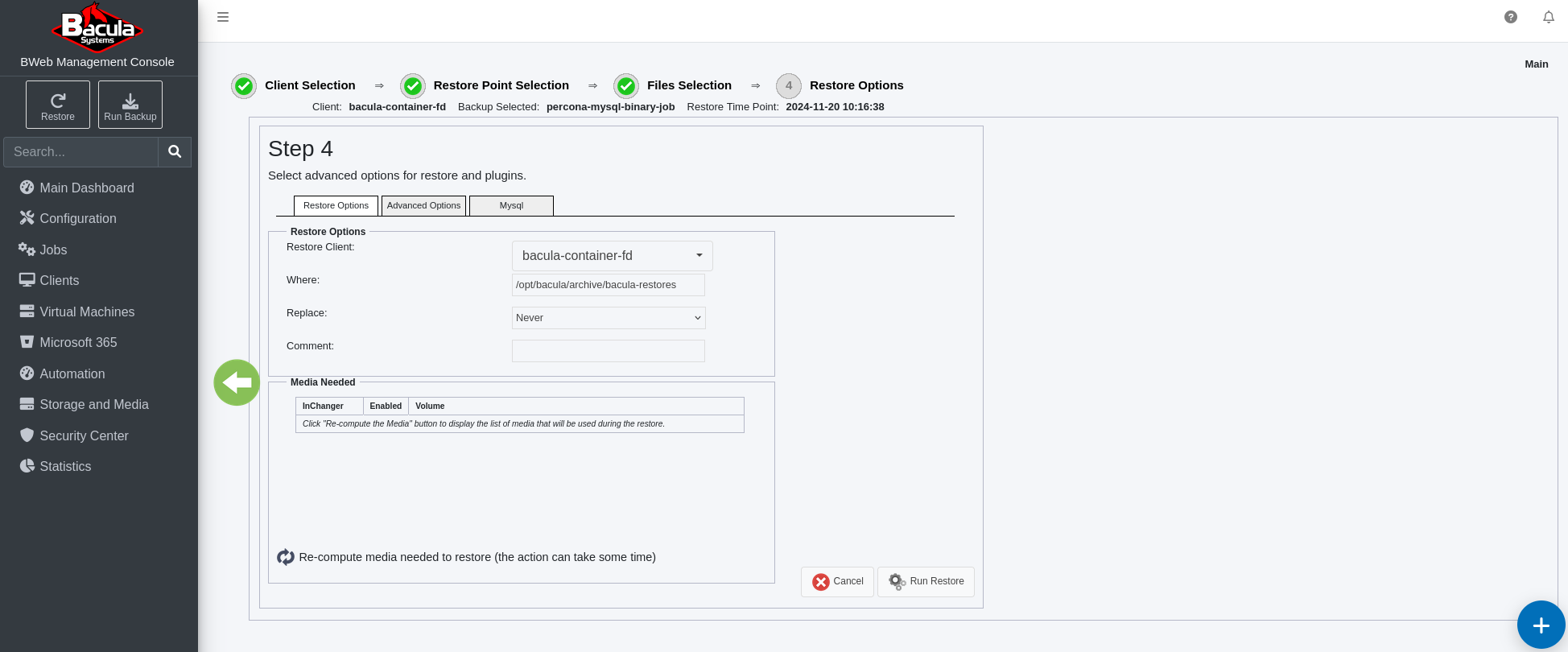
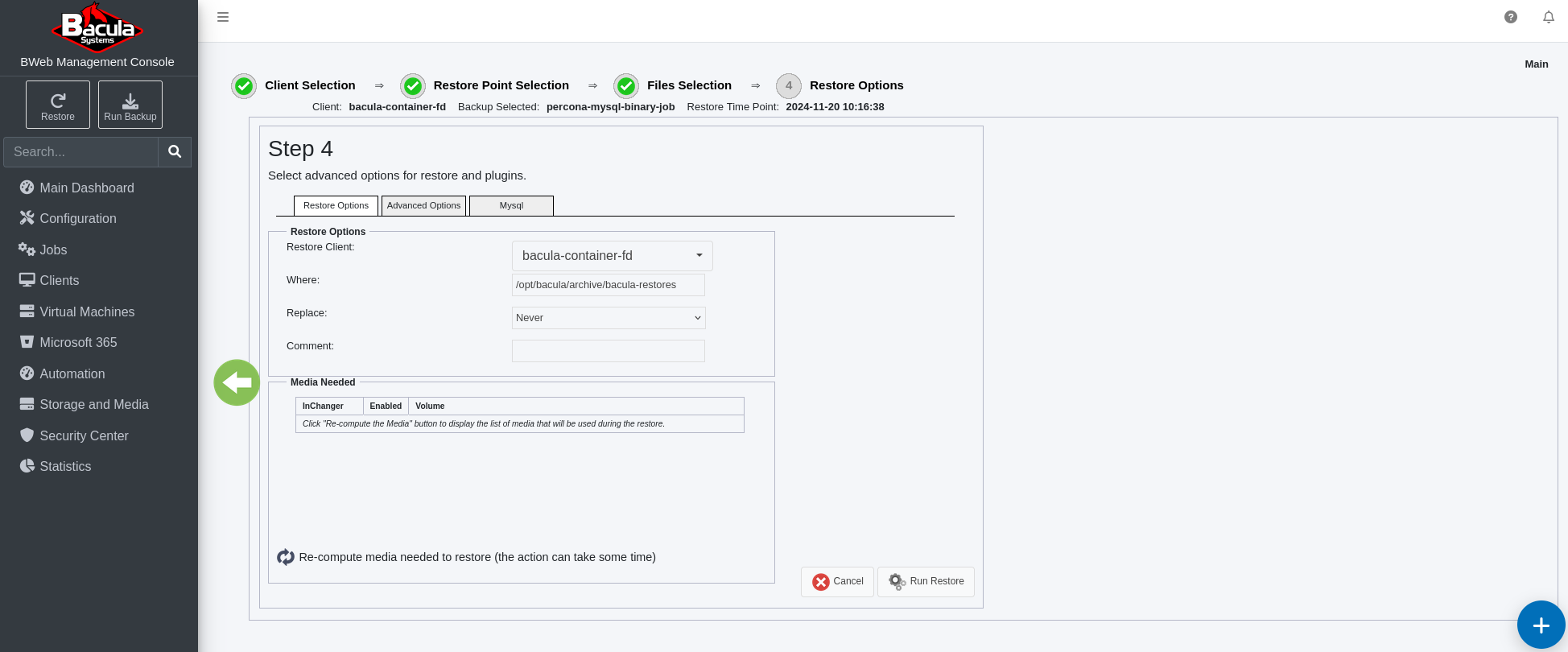
Procedure using xtrabackup to Restore Data into datadir in Cluster Persistent Volumes
cd /opt/bacula/archive/bacula-restoresto create a directory for the Full, and one for each Incremental job:mkdir fullmkdir incr1mkdir incr2
cd @MYSQL/main/in the directory you have restored the files.decompress the
.xbstreamfiles in the correspondingfull,incr1andincr2directories:cd /opt/bacula/archive/bacula-restores/full && xbstream -x < /opt/bacula/archive/bacula-restores/@MYSQL/main/all-databases.xbstream(Full job)cd /opt/bacula/archive/bacula-restores/incr1 && xbstream -x < /opt/bacula/archive/bacula-restores/@MYSQL/main/all-databases.34206973.xbstream(first Incremental job)cd /opt/bacula/archive/bacula-restores/incr1 && xbstream -x < /opt/bacula/archive/bacula-restores/@MYSQL/main/all-databases.34208728.xbstream(second and latest Incremental job)
Prepare Full and the Incremental jobs:
Prepare the Full job using the –apply-log-only option, in the Full level job directory:
xtrabackup --prepare --apply-log-only --target-dir=/opt/bacula/archive/bacula-restores/fullApply the Incremental backup to the Full backup using the –apply-log-only option:
xtrabackup --prepare --apply-log-only --incremental-dir=incr1 --target-dir=/opt/bacula/archive/bacula-restores/fullApply the latest Incremental backup to the Full backup not using the –apply-log-only option:
xtrabackup --prepare --incremental-dir=incr2 --target-dir=/opt/bacula/archive/bacula-restores/full
Copy the backup to the datadir of the server/cluster:
xtrabackup --datadir=/var/lib/mysql --copy-back --target-dir=/opt/bacula/archive/bacula-restores/full
Start Percona XtraDB Cluster
# kubectl -n pxc patch --type=merge --patch='{ "spec": { "pause": false } }' pxc pxc-db
perconaxtradbcluster.pxc.percona.com/pxc-db patched
Go back to the Use Cases page.
Go back to the MySQL Plugin page.
Go back to: Use Cases.